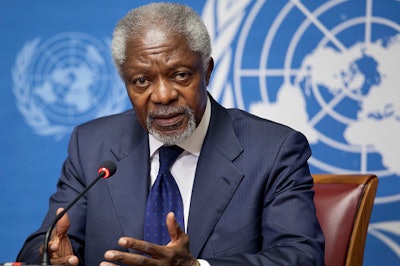Kofi Annan, who died over the weekend at the age of 80, broke barriers.
Annan, who became the first U.N. secretary general from sub-Saharan Africa, rose through the ranks of career U.S. diplomat to become the secretary general of the U.S. from 1997 to 2006. Along the way, he received the Nobel Peace Prize for his work in fighting the AIDS epidemic and international terrorism.
Over the weekend, flags outside of the United Nations headquarters in New York were lowered to half staff in honor of Annan. And scholars, activists and humanitarians paid tribute to the affable diplomat.
 Kofi Annan
Kofi Annan“Kofi Annan emerged as one of the most important and eloquent voices on the world stage promoting the urgency of human rights around the world, especially in conflict and war zones,” said Dr. Peniel E. Joseph, the Barbara Jordan Chair in Ethics and Political Values and Founding Director of the Center for the Study of Race and Democracy at the LBJ School of Public Affairs at the University of Texas-Austin. “As the first African secretary general of the U.N., he leaves behind a legacy as a human rights champion who believed in the power of diplomacy, moral persuasion, and coalition building as building blocks to creating a more just world.”
Civil rights leader, the Rev. Jesse L. Jackson, Sr., called Annan “one of the best U.N. secretaries” who had the “capacity and vision to reconcile opposites.”
Born on April 8, 1938 in the Gold Coast (now Ghana), Annan earned a Ford Foundation grant that enabled him to study at Macalester College in St. Paul, Minnesota. He later earned a master’s degree in management from the Sloan School of Management at MIT.
In 1962, he began work as a budget officer for the World Health Organization, an agency of the United Nations and advanced within the organization.





















